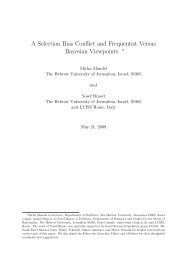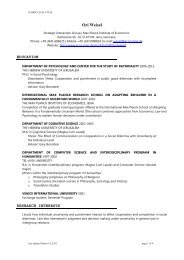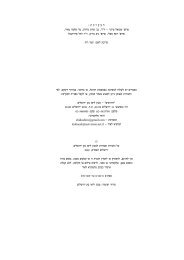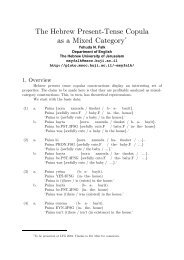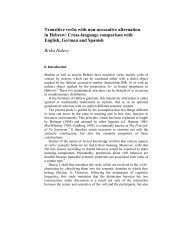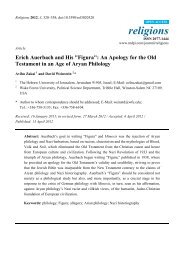The Federal Reserve May Be Politically ... - Pluto Huji Ac Il
The Federal Reserve May Be Politically ... - Pluto Huji Ac Il
The Federal Reserve May Be Politically ... - Pluto Huji Ac Il
You also want an ePaper? Increase the reach of your titles
YUMPU automatically turns print PDFs into web optimized ePapers that Google loves.
engage in such expansion and to frustrate attempts by le-wing parties to do so. In<br />
effect, central bankers in such a world face an inter-temporal trade-off when rightwing<br />
government are in power. ey can push for the policy closest to their ideal<br />
point in the feasible set knowing that doing so decreases the likelihood that the rightwing<br />
party gets re-elected, or they can accept a more expansionary policy now in<br />
exchange for an increase in the probability that the government in power during nonelectoral<br />
times will be closer to its ideal point. 2 In contrast, when le-wing parties are<br />
in power, a conservative central banker faces no such dilemma. Political preferences<br />
align with the Fed’s well publicized commitment to price stability since the political<br />
consequence of following through on that commitment is an increase in the probability<br />
that a government with an ideal point closer to its own will get elected. us,<br />
we can expect independent central banks to act like conservative independent central<br />
banks - but only when le-wing governments are in power. When the party(ies)<br />
the central bank favors are in power, the central bank should be more willing to accommodate<br />
pre-electoral expansions, that is, it should act in the fashion traditionally<br />
associated with dependent central banks. It is important to note, however, that this<br />
conditional accommodation is not evidence of a lack of independence. Far from it.<br />
It is evidence that the bank is using its independence to act on the fact that it is not<br />
indifferent.<br />
1.3 Caveats<br />
So far we have assumed that independent central bankers have conservative preferences<br />
over monetary policy, but we have not explained why they would hold such<br />
preferences. We can invoke three reasons to justify this assumption. First, according<br />
to the logic of the Rogoff model, central bank independence is created in order<br />
to overcome the time inconsistency problem that plagues monetary policy. If those<br />
who grant independence to the bank do so for this reason, it would not make sense<br />
to appoint anyone other than an ination hawk. Some might nd it anachronistic to<br />
attribute this chain of reasoning to political principals operating decades before Kydland<br />
and Prescott, Barro and Gordon, and Rogoff, but there are other reasons why<br />
central bankers might be conservative. Monetary policy is a technical endeavor and<br />
exercising effective leadership of a central bank without a solid command of the economics<br />
of nancial markets is highly unlikely. us, central bankers are likely to be<br />
2 Another interpretation of the situation is that right-wing parties become “as if l” they were a lewing<br />
party as elections approach and central banks are merely responding to a new ”reversion” point -<br />
the point that the right wing government is implicitly threatening to implement if the central bank does<br />
not accommodate their temporarily expansionary wishes. But if this was what was going on, the central<br />
bank should also become more expansionary when elections draw near when le wing parties control<br />
the government.<br />
6


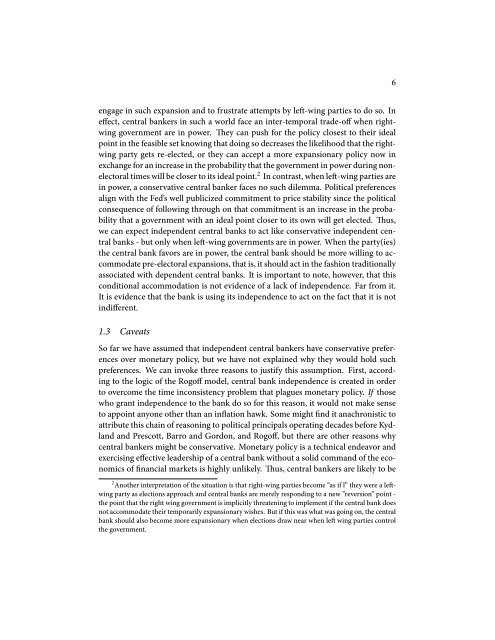
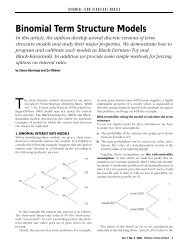
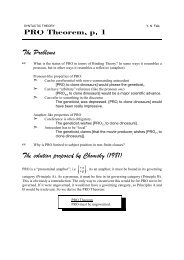
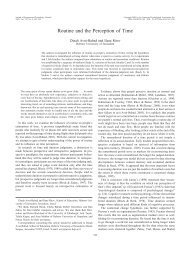
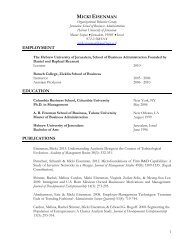
![CV [PDF] - Pluto Huji Ac Il](https://img.yumpu.com/18174585/1/190x245/cv-pdf-pluto-huji-ac-il.jpg?quality=85)
